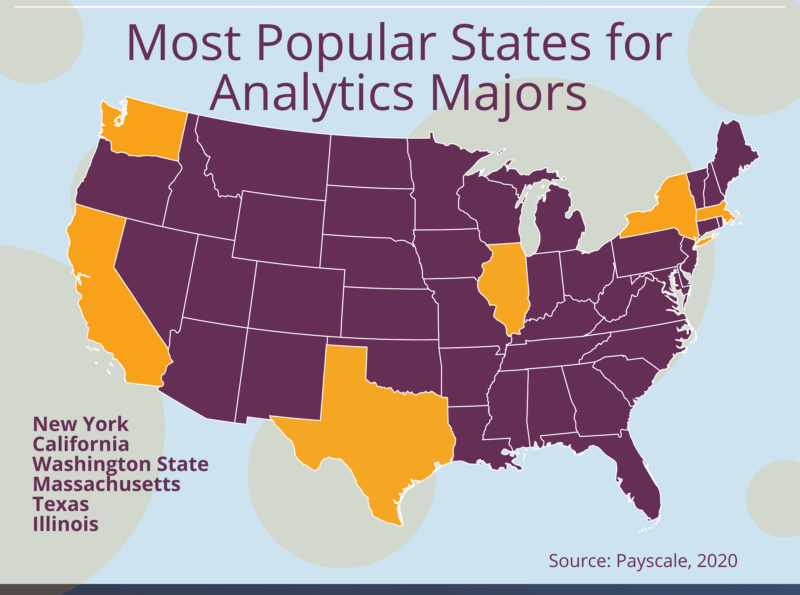Before entering college, prospective students may come across majors that are new to them. For instance, while reviewing different course offerings, students may wonder: “What is business analytics?” In the simplest of terms, business analytics will involve the collection, sorting, and studying of business data. The goal of those in the business analytics field is to transform raw data into usable and high-value business insights. To get a job in business analytics, most firms require an undergraduate degree and a professional certification in the field.
What is Business Analytics and Business Intelligence?
There are many categories within the field of business analytics. As an example, prospective students usually want to know what is analytics and business intelligence. Are business analytics and business intelligence interchangeable terms? Although the two have similarities, business analytics and business intelligence are not identical. Common job titles within the analytics industry include business analyst and business intelligence analyst.
Both positions involve analyzing data sets for the benefit of the company. However, a business analyst uses data to analyze specific departments within an organization. The analyst looks at current programs in place and the results each department is achieving under the current work conditions. The business analyst is expected to offer solutions to help improve processes within a department. In turn, a business intelligence analyst is more focused on the big picture than analyzing a single department within an organization. They look at all business data from an organization as well as competitors. This gives a broader picture on how a company is doing not only as a whole, but also within the industry.

Similar skills are needed for a business analyst and a business intelligence analyst. Soft skills needed include good communication, leadership qualities, critical thinking, close attention to detail, and time management. Technical skills are a part of the job too since the analyst must be comfortable working with large sets of data and knowing what programs are available for analyses.
Although bachelor-level degrees for business analytics are available, colleges do also offer graduate-level degree options. At both the undergraduate and graduate level, the future executive learns about data analysis, accounting analysis, management science, and finance. Many colleges provide the option to attend degree tracks for business analytics online. Undergraduate and post-bachelor programs are offered at an accelerated rate with graduation requirements potentially fulfilled in three years or less.
Besides looking at what is business analytics, professionals often want to know what type of careers are available. One potential query: “What can I do with a degree in business analytics?” After degree conferment, the following are job opportunities to consider after finishing a business analytics program:
- Market Research Analyst
- Business Analyst
- Marketing Executive
- Quantitative Analyst
- Data Manager
- Consultant
Specialized jobs within the field will have different education requirements. Potential professionals may wonder what’s the difference between each degree program. As an example, a common query is “What can I do with a degree in business intelligence and analytics?” Business intelligence is considered a more specialized field. In turn, salaries are highly competitive. According to the Bureau of Labor Statistics, the average salary of business intelligence analysts exceed $83,000 per year. Job seekers with this type of degree may become:
- Data Specialists
- Business Consultants
- Project Managers
- Business Intelligence Analyst
Course offerings and major options for any business analytics-related major depend solely on the college. Students want to ask the following of admissions staff: What is data analytics? What is big data analytics? What types of programs offer training on both these subjects? The program selected by the prospective student should include traditional data analytics and big data analytics within the curriculum. The main difference between the two disciplines is data analytics focuses on standard data sets while big data analytics relates to dealing with data sets too large for traditional software analysis programs.
Since business analytics is such a broad field, colleges present numerous pathways to earning a degree or certificate in the discipline.
School and Program Accreditation for Analytics
Any college chosen by the prospective student needs proper accreditation for successful job placement post-graduation. For a college to become accredited, both the school and degree program must meet the accreditation board’s requirements. The following facets are reviewed prior to accreditation: curriculum, teaching staff members, and overall post-graduation outcomes. Accreditation is extremely important when looking for a job in the field of business analytics. Prospective employers are likely to review the program completed by the applicant to confirm legitimacy. Also, if the student requires financial aid, accreditation is a must. Federal funding is only granted through colleges with regional accreditation. There are both regional and national accreditation agencies for colleges and universities with business analysis degree programs. However, for undergraduate degrees, regional accreditation is preferred. National accreditation may be acceptable for certificate programs.
Regional accreditation confirms that any credits earned through the program will more likely be accepted as transfer credits. However, schools are not forced to accept any type of transfer credit. It’s up to the school’s sole discretion. Students should reach out to any colleges offering business analytics degrees to determine what type of undergraduate transfer credits may be applied to graduation requirements. All 50 states are assigned a specific regional accrediting agency. As an example, the Middle States Commission on Higher Education is responsible for accreditation in northeast states such as New York, New Jersey, and Delaware.
The primary accrediting body for business is the AACSB, the Association to Advance Collegiate Schools of Business, while computer science programs are often accredited by ABET, the Accreditation Board for Engineering and Technology. Business analytics and data analytics programs are often found in either the business school or the computer science school.
Within the field of business analytics, there are multiple accrediting bodies. These accreditation organizations are mostly responsible for accrediting certification programs. A certificate in business analytics is a good idea to pursue after receiving a bachelor’s degree in business, finance, or economics. The three main accrediting agencies for business analytics are the International Institute of Business Analysis, the International Qualification Board for Business Analysis, and Project Management Institute.

The International Institute of Business Analysis (IIBA) is a professional organization that provides accreditation for certificate programs sought after by business analysts. Those in the field can join the organization for access to these programs along with sharing industry news and networking events. Membership for the organization exceeds 27,000 worldwide and local chapters are found within dozens of regions in the United States.
At the International Qualification Board for Business Analysis (IQBBA), all trainings are certified by an accrediting body before offered to members. The organization’s mission is to retain best standards within the business analytics industry. Based on experience level, IQBBA members have access to different certification programs.
Through the Project Management Institute (PMI), business analysts are able to access a range of certification programs. The organization has a broad membership base with more than 55,000 paid members around the globe. The certified trainings cover a range of topics with analysts choosing to take the PMI-PBA course.
Types of Analytics Bachelor Degrees
Undergraduate degree options within business analytics depend on the college. Some programs may offer a traditional Bachelor of Science in Business Analytics. Other higher learning institutions could have different titled majors that are still appropriate for those pursuing a career in business intelligence and analytics. Potential major options in addition to business analytics include business foundations, business writing, business communications, statistics, data analytics, and business law.
Many colleges, both traditional and online, may not offer business analytics as a major choice. However, more and more higher learning institutions are offering business analytics as a co-major option. Along with business analytics, the student pursues a bachelor degree in business economics, accounting, marketing, management information systems, technology innovation management, international business, and legal studies. At graduation, the applicant will receive two degrees including a Bachelor of Science in Business Analytics.
Another option is a dual degree track that permits the student to earn both an undergraduate and graduate degree simultaneously. Through this type of program, the student pursues both a Bachelor of Science in Business Analytics and a Master’s in Business Administration. Additionally, if a college doesn’t offer business analytics as a major option is to minor in the subject. Through the minor option, a minimum of 24 credits is usually needed for graduation.
Courses within a business analytics major and minor focus on methodologies for analyzing business data. Requirements for graduation may include Introduction to Data Analytics, Programming for Data Analytics, Predictive Business Analytics, Data-Driven Marketing, Introduction to Data Mining, and Introduction to Big Data Analytics. At a traditional college, degree requirements for a bachelor’s degree will take four years. For those with a minor or co-major, it may require up to five years of full-time study.
More options are offered at the graduate level. However, prospective business analysts are usually able to secure an entry-level position with a firm after earning an undergraduate data analytics degree online. After finishing the bachelor-level program, the firm may ask the analyst to complete a certificate in analytics.
Online Business and Data Analytics Programs
A business analytics online degree provides the opportunity to prepare for a career in the field. Data analytics degrees online give flexible scheduling option to permit the student to take courses in his or her free time. Many business analytics degrees online are part-time or allow the individual to set the pace. All degree requirements are usually met in less than four years of study. Semesters for online business analytics degrees are usually abbreviated and may only last six to eight weeks. The rigorous pace makes these types of programs challenging, but rewarding. Due to the high standards of data analytics online degrees, these programs promise an exceptional return on investment. Online learning is so widespread managers no longer see a distinction between those who have earned a degree at a brick and mortar college and those in distance learning programs.
Online business analytics degrees have the same curriculum as traditional bachelor programs that take place on campus. Core courses in business are needed as well as specialized classes in business analytics. Virtual colleges may have the following undergraduate classes within their business analytics degrees online curriculums:
- Marketing Management
- Business Management
- Database Management
- Quantitate Research and Analysis
- Big Data Analysis
- Data Mining
- Introduction to Business Analytics
- Advanced Business Analytics
- Programming for Statistics
To earn a data analytics degree online, the student either has to take all classes online or complete a hybrid schedule. With a hybrid format, most classes are done online with only a modest number of campus visits needed. The same tools are offered to traditional and online students. The student is given access to academic advisors and career counselors. Tuition costs are usually the same for traditional and data analytics online degrees. However, online degree programs cost less in the long run. Students save on commuting costs and course materials. Plus, there is no income interruption since students are able to continue working while attending an online college.
Certificate Programs for Analytics
Getting a certificate in business analytics is highly recommended for career advancement. The certificate in analytics demonstrates to the prospective employer that the professional has received specialized training on the latest tools in data analytics. Depending on the certification program, an online certificate in data analytics may be offered. However, some organizations still choose to hold proctored examinations.
 The PMI-PBA certification in business analytics is used to highlight the person’s organizational skills and capabilities in driving preferred business outcomes. To qualify for the certification in business analytics, the applicant must have a bachelor’s degree and a minimum of three years of business analysis experience. The online certificate in analytics is good for three years and can be renewed as long as the analyst completes 60 professional development credits within that timeframe. If the applicant for the program doesn’t have a bachelor’s degree, he or she must have at least five years of industry experience. Certificate courses are offered through PMI to prepare for the examination. Exam costs are based on whether a not the applicant is a paid member of the PMI organization.
The PMI-PBA certification in business analytics is used to highlight the person’s organizational skills and capabilities in driving preferred business outcomes. To qualify for the certification in business analytics, the applicant must have a bachelor’s degree and a minimum of three years of business analysis experience. The online certificate in analytics is good for three years and can be renewed as long as the analyst completes 60 professional development credits within that timeframe. If the applicant for the program doesn’t have a bachelor’s degree, he or she must have at least five years of industry experience. Certificate courses are offered through PMI to prepare for the examination. Exam costs are based on whether a not the applicant is a paid member of the PMI organization.
IQBBA provides entry-level certification in business analytics. In order to qualify for any higher-level certifications, the entry-level program must be completed. There are no pre-requisites for the entry-level certificate, but certificate courses in business analytics is offered through the organization to help test takers prepare. Tests from IQBBA must be completed in person at an accredited exam facility. Exam centers are located in different regions throughout the United States.
IIBA is one of the only organizations that have multiple certificate programs, including a certificate in big data analytics. Entry-level analysts will apply to the Entry Certificate in Business Analysis and can do so even without a bachelor degree. The only requirement for this examination is 21 professional development credits finished within the last four years. Level 2 and Level 3 certification in business analytics is also available through IIBA. To qualify for the Level 2 examination, at least 3,750 hours in the field of business analytics is needed. For Level 3, a minimum of 3,750 hours of business analytics experienced is needed. Each examination gets progressively more difficult with Level 3 requiring 3.5 hours for test completion. For Level 2, the certified analyst needs 21 professional development hours over a four-year time period while Level 3 certification requires 60 professional development credits over the course of three years.
The majority of prospective business analysts obtain certifications in business analytics. This is especially important if the applicant has a degree in another field. Certifications in analytics validates the person’s skill set. Recruiters will know that the applicant has met the competencies required by the certification program. A certification in analytics may also be used to leverage salary. Salary packages may be more lucrative since employers know the person has gone through the necessary trainings to prepare for the career. Certification programs also have the potential to act as a networking tool. While preparing for the certification in analytics exam, the professional may meet other peers within the industry.
Another reason to consider certifications in analytics is the programs can prepare the person for a specialization. Specializations in analytics that are in demand include deep learning, data engineering on Google, data mining, big data analysis, customer analytics, and operations analytics. Employers can advise on what certification programs are appropriate for the position. Although business analytics certifications are available through IIBA and IQBBA, other organizations may have certifications for any in demand specialization in data analytics. Microsoft, INFORMS, and Cloudera are just a few organizations that has programs for specializations in analytics that are in demand. To qualify for these examinations, online training is usually needed as well as a minimum of professional experience.
Licensure is not required to work in the field of business analytics. Employers set all hiring requirements with no licensing needed through governing bodies.
Careers in Analytics
Careers in data analytics provide the opportunity for the professional to help a business evolve and grow. Analysts are needed in different capacities within an organization. A career in analytics involve working within a company’s finance, marketing, or sales department. Career prospects in data analytics are promising. This is because so many companies require the skills of an analyst. Potential business analytics degree jobs can be found through private firms, non-profits, and government agencies.
The top jobs for data analytics include:
- Financial Analyst
- Business Intelligence Analyst
- Business Analyst
- Market Research Analyst
- Operations Research Analyst
- Information Research Scientist
- Business Intelligence Consultant
A financial analyst provides a lucrative career in analytics. The executive is responsible for reviewing a company’s finances and making recommendations on what steps to take to improve the bottom line.
A business intelligence analyst involves collecting data within an organization and analyzing how each department is performing under current conditions. If possible, the analyst gathers data sets from competitors to compare results.
A business analyst provides similar tasks as a business intelligence analyst. However, the role within an organization is more focuses. For instance, management may ask the analyst to review a department that is performing poorly to help gain insights on how to make improvements.
Another career in business analytics is a market research analyst. Typically, this type of analyst works per diem or on a freelance basis. The market research analyst researches current market conditions as a way to determine consumer trends. The analyst helps a business determine whether a product or service is needed in the current market conditions.
A business analytics job description for an operations research analyst is likely to include phrases such as “reduce overhead” and “improve efficiency.” Analysts within this sector usually advise managers and directors on strategies to better manage supply and demand.
For information research scientist careers, the analyst evaluates current technologies utilized by the organization. Changes will be suggested by the analyst within IT departments to boost efficiency, improve data security, and increase revenue.
A business intelligence consultant works for a variety of clients instead of a single organization. He or she will be hired to tailor business solutions to the organization’s precise needs. Consultants choose their own hours and schedules.
The preceding is just a sampling of data analytics entry-level jobs. When certifications are earned or graduate-level degrees conferred, even more career options open up. As an example, a director of business analytics job description is likely to request candidates who are able to manage analyst activities for an organization. A good leader is needed to use business analytics strategies to achieve organizational goals. The director will be in charge of ensuring all personnel are improving profitability and operations for the company.
Data and Business Analytics Jobs Salary Potential
Data analytics job salary averages are very competitive. Management analysts have one of the highest business analytics degree salary averages at $83,610 annually. Management analysts require a minimum of a bachelor degree and a certification as a Certified Management Consultant. Operations research analysts have a very similar business analytics salary at $83,390. Big data analytics salary is very lucrative with companies paying upwards of $85,000. Pay rates are competitive for this position due to the high demand for professionals with this type of background.
Average data analytics starting salary typically falls into the $50,000 to $65,000 range. With a bachelor’s degree, a market research analyst can secure a position with an average pay of $63,120.
Within the job field, a data analytics major salary can be impacted by place of employment. The top paying organizations for data analysts are the federal government, manufacturing firms, and technical companies. Salaries for analysts that work at the federal government exceed $110,000 per year.
Metropolitan areas will have the highest number of available business analyst jobs. Top paying states for data analysts are:
- New Jersey
- Virginia
- New York
- Hawaii
- District of Columbia
Professional Organizations
Joining a professional organization for business analysts provides the opportunity to network with others in the field. The organization is also likely to keep analysts abreast of any industry news. Most importantly, professional organizations sponsor training sessions for business analysts and offer a selection of certification programs. Organizations for those in the field of business analytics include:
- International Institute of Business Analytics
- Digital Analytics Association
- INFORMS: Institute for Operations Research and Management Sciences
Related Rankings:
25 Best Bachelor’s in Analytics
15 Best Online Bachelor’s in Analytics
10 Fastest Online Bachelor’s in Analytics
